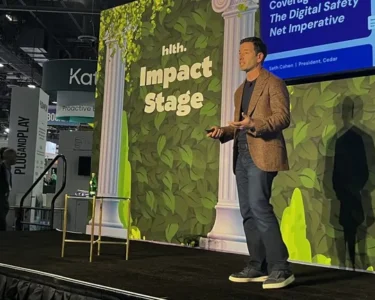AI is entering the exam room faster than many expected, but will patients accept it? And will all clinicians trust it? The early wins on documentation are clear, yet adoption hinges on something less visible: patient comfort and whether governance of AI can keep pace.
Dr. Randy Thompson, Chief Health Analytics Officer at Billings Clinic, Montana’s largest independent health system, has been on the frontlines of testing AI agents inside its Oracle Health EHR. His experiences highlight why adoption depends less on technical performance and more on trust from patients in the chair as well as clinicians reviewing the output.
Key Takeaways
- Governance will make or break AI adoption. For Dr. Thompson, the real strategic question is no longer if AI works—it’s whether governance structures can validate and sustain trust as dozens of new solutions roll out at once.
- Framing AI for patients reduces resistance. Even in sensitive specialties like psychiatry, patient pushback was minimal once AI was explained as a tool to capture details so the doctor could stay focused on them.
- Cognitive burden matters as much as documentation burden. By capturing every detail in real time, Oracle’s Clinical AI Agent speeds up notes and helps clinicians think less about mechanics and more about patients, reducing fatigue at the end of the workday.
Governance will decide what sticks
According to Dr. Thompson, the challenge of proving whether AI is valuable is becoming smaller when compared to the challenge of managing the flood of new AI tools from Oracle and other vendors. Each one offers significant potential benefits, but there is also significant risk if governance can’t keep pace.
As he put it: “Can I trust the solution? And… has it been validated? Does it actually do what it says it’s supposed to do? Those are hard questions, and that’s where AI governance comes in. Everybody is struggling with AI governance. We’re changing how we plan for the future. We need to stay on top of this and stay current.”
Dr. Thompson shared the example of Oracle’s Clinical AI Agent. Clinicians quickly recognized that this capability would save them time (and even reduce cognitive burden – see below), but they wanted reassurance that it was safe to rely on in front of patients. Thompson described how the team reworked governance structures to give providers confidence that there would be a process to check the output and validate the results.
This governance process was key to the successful rollout of the Clinical AI Agent at Billings Clinic.
Patients don’t fear AI when you frame it right
The idea of an app “listening in” can sound unsettling, especially in sensitive visits. But reframed as a tool that helps doctors focus, concerns faded, even in psychiatry. Thompson noted:
“When they [patients] understand that… we’ve had very few refusals from the patient side of this, even with complex and sensitive conditions like psychiatric visits.”
Instead of worrying about surveillance, patients saw an AI agent that gave them more eye contact and attention in the room. Several even remarked that their doctor was now “talking to me instead of typing into the computer.” That small yet visible change aligns directly with the community-first care Billings Clinic is known for.
Cognitive load is the hidden burden
While documentation is often cast as the main villain, clinicians also face the constant mental drain of juggling details mid-conversation. One ENT specialist told Thompson she used to “type, talk and listen all at the same time.” After AI, she described a different ending to her day: “She says at the end of the day, she has more energy and feels less fatigued because she’s not thinking about all those details.”
Trust Will Carry AI Forward
The conversation about AI in healthcare often starts with documentation improvements, but Dr. Thompson suggests that we should look in different direction first. Trust built through governance. Trust earned through careful framing of new technology with patients and clinicians.
He was also clear about where that trust extends on the vendor side. Billings Clinic is already beta testing 17 Oracle Health solutions, from ambient documentation to new EHR modules, and Thompson described his team as “very positive” about Oracle as their long-term partner. That partnership has manifested in physicians being able to leave the office at 5:30 with all their notes done and patients noticing their doctor looking them in the eye during an appointment. Those are the best proof points that AI is making a difference.
Learn more about Billings Clinic at https://www.billingsclinic.com/
Learn more about Oracle Health at https://www.oracle.com/industries/healthcare/
Listen and subscribe to the Healthcare IT Today Interviews Podcast to hear all the latest insights from experts in healthcare IT.
And for an exclusive look at our top stories, subscribe to our newsletter and YouTube.
Tell us what you think. Contact us here or on Twitter at @hcitoday. And if you’re interested in advertising with us, check out our various advertising packages and request our Media Kit.




